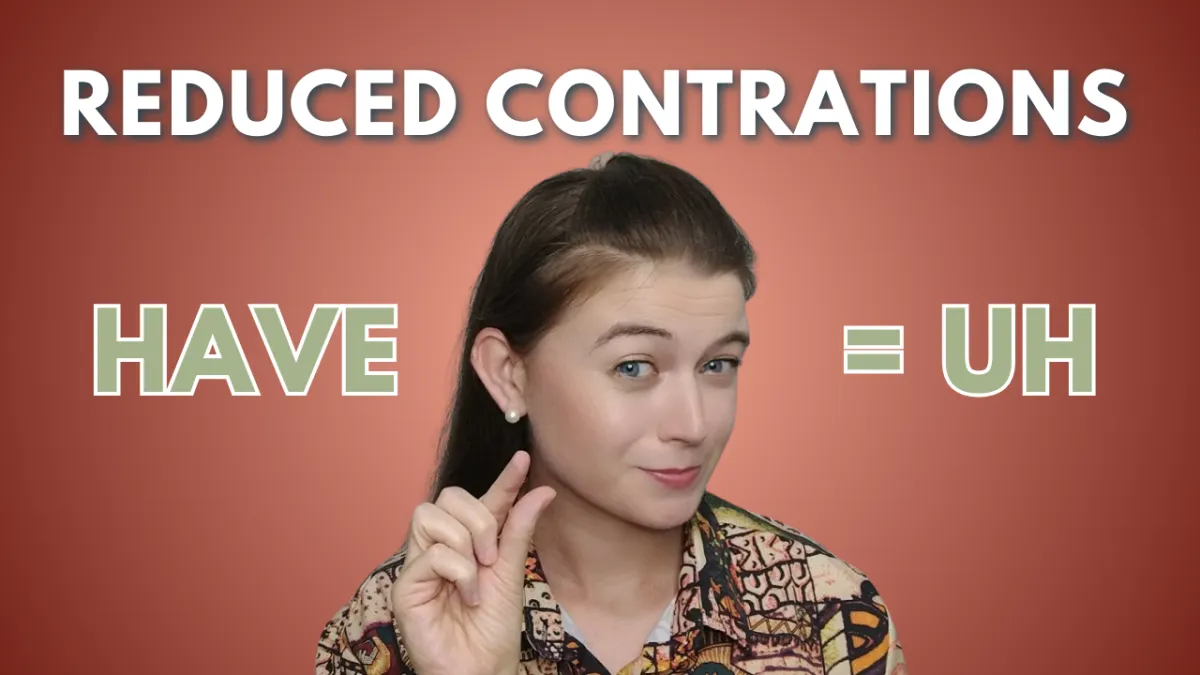
Why Fast English Is So Hard to Understand — Reduced Contractions
If you’ve been learning English for a while, you probably know this feeling:
👉 You understand English in class.
👉 You understand English in subtitles.
❌ But when a native speaker talks fast? You’re lost.
It’s not your fault.
There’s a reason why fast, natural English sounds so confusing — and it has everything to do with how native speakers reduce small words.
Native speakers reduce many sounds, but one of the most common situations is with contractions.
Let’s break it down.
🎧 Why Is Fast English So Hard to Understand?
When native speakers talk, they don’t pronounce every word clearly.
In fact, they often do the opposite — they blend, reduce, or drop sounds completely.
Textbook:
“You should have called me.”
Real life:
“You shoulda called me.”
That tiny change — from “should have” to “shoulda” — happens in everyday speech, and most learners never learn to listen for it.
🔍 The Hidden Problem: Reduced Contractions with “Have”
In fast English, “have” becomes a tiny sound — often just “uh.”
This happens most often after modal past modal verbs like:
would have = would've
should have = should've
could have = could've
might have = might've
must have = must've
These reduced forms are called contractions, and they’re everywhere.
To make it even more complicated, You can even reduce these contractions further. You might hear a native speaker say:
“I woulda told ya.”
“She coulda helped.”
“He musta known.”
If you’re not listening for that little “uh” sound, you might miss the entire meaning of the sentence.
🔟 10 Common Reduced Contractions You Need to Know
Here’s a list of the most common contractions where “have” gets reduced to "uh":
1. Would have → woulda
💬 “I woulda told ya.”
2. Should have → shoulda
💬 “You shoulda called me.”
3. Could have → coulda
💬 “He coulda helped ya.”
4. Might have → mighta
💬 “She mighta left.”
5. Must have → musta
💬 “He musta known.”
6. Would have been → woulda been
💬 “It woulda been better.”
7. I’d have → Ida
💬 “Ida told 'em.”
8. Shouldn’t have → shouldna
💬 “You shouldna done that.”
9. Wouldn’t have → wouldna
💬 “He wouldna known.”
10. Couldn’t have → couldna
💬 “We couldna made it without you.”
These small sounds make a big difference — n' alotta learners miss 'em.
🎬 Watch the Clip: Can You Hear This?
👇 In this short clip, I explain how these reduced contractions work — and why they’re so confusing.
Be sure to rewatch this video to train your ear to better understand native speakers. Repeat after me out loud so your pronunciation can sound more like that of native speakers, too!
🗣️ How to Train Your Ear for Real Spoken English
Here are a few quick tips to improve your listening comprehension:
Listen to native speakers in real conversations — not just slow or scripted audio
Repeat after native speakers using reduced contractions
Watch videos like this one and shadow the pronunciation
Don’t worry about hearing every word — focus on meaning through rhythm and stress
👥 Practice Makes Fluent: Train with a Native Speaker
Reading and watching videos is a great start — but if you really want to understand native English and speak more fluently, the best thing you can do is practice regularly with a native speaker.
When you work with someone who speaks naturally, you can:
Hear reduced contractions in real time
Get feedback on your own pronunciation
Learn how native speakers really talk — not just what's in textbooks
Build confidence in real conversations 💬
🎓 Join My Classes + Free Consultation!
If you're serious about improving your listening and speaking, I’d love to help you.
In my classes you will receive:
✅ Personalized feedback + corrections
✅ Focused listening + speaking practice
✅ Real-world English, explained clearly
👉 Click here to book your free consultation and get started!
🎧 Want More? Watch the Full Podcast Episode
Reduced contractions is just one missing piece of the fast English puzzle!
In the full episode, we go deeper into:
How native speakers connect words
Why listening feels impossible (and how to fix it)
The most common reductions that trip learners up
